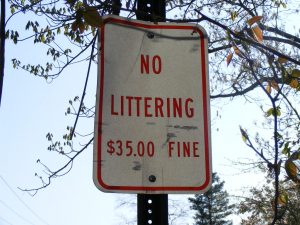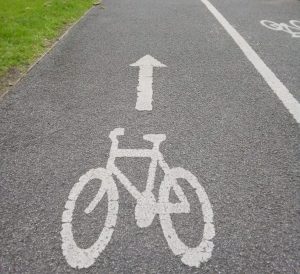Menu image: “no-littering.JPG” by MyNameMattersNot is licensed under CC BY 2.0
Many of the ideas on Smart Renting operate at an individual level which is great if you looking no further than household change. If you are seeking social and environmental justice at a greater level, individual change is a great place to start and a terrible place to stop.
Since the corporate sponsored “Keep America Beautiful” littering campaign in 1971, both well-meaning people and people seeking to undermine positive changes in the community and beyond have exclaimed that it’s up to “individuals” to fix problems [1]. It’s not that simple.
Strengths of individual change:
- It’s easy to get started if you have the option of making a personal change and requires no one else, or at least few additional people to make it happen.
- It can help motivate you to join in on collective action if you can already see something working at an individual/household level.
- If you are involved in collective action, individual choices, if possible, can help to establish your credibility, even inspiring others to do something similar.
- Individual lifestyle changes (like many of the ideas presented on Smart Renting) can reduce your need to earn money and free up time (and even money) to contribute to a greater cause.
- If you are a very powerful person, especially if your actions are causing great harm to lots of other people, individual change can achieve something substantial.

Where individual change falls short:
- Some individual changes are not possible without collective action to set up the systems necessary for that change.
- There are systems that actively encourage or even coerce people to engage in behaviour that is harmful to themselves or others.
- Neoliberal politics have convinced many people in the Western world that their choices are powerful, yet as separate individuals, many of us have little power at a state level or beyond.
- Focusing heavily on individual change can lead to people blaming other people rather than focusing on the powerful people and institutions that enable bad behaviour in the first place.
Here’s why we need collective change:
- Big positive changes in communities and beyond were achieved only through collective action.
- Citing the 40 hour workweek, the civil rights movement, environmental protections of the 1960s and 70s and the marriage equality movement as examples, none of these things were possible without the muscle and determination of a movement of people focused on getting something to change.
- Systematic change can encourage more people to do the right thing. For example, the Netherlands have high rates of cycling because the people there in the 1970s fought for a system, culture and for infrastructure that made cycling much more accessible [2].

A synergy between individual and collective change:
- Both individual and collective change can work well together as long as you remember that the world shouldn’t be resting alone on your shoulders. ´
- If you can make a change, great then do so, especially if it is straightforward and helps to leverage any collective action you want to be involved in.
- If you can’t make a change individually, it doesn’t diminish your voice in a collective movement. Thomas Edison wasn’t a hypocrite just because he used candlelight to invent a lightbulb.
A personal example:
- One of us, having been appalled during the Iraq war coverage at the idea of fighting wars to get oil to continue an unsustainable way of life was motivated to go car free.
- Yet it still took us 8 years to become car free because it wasn’t easy at first in a country that heavily encourages oil based car transport over everything else.
- And even today, we cannot avoid oil consumption entirely.
- Our choice to go car free has great personal and small scale environmental benefits but we are realistic that alone it won’t change the greater system that led to the Iraq war in the first place.
- This is why, in step with our personal choice, it is important to support collective movements that are pushing for cheaper and more sustainable transport, better urban and better rural planning.
If you can make personal changes that are good for you and others, great. Even better is to use individual actions to leverage changes at a greater level through collective action.
Further Reading:
[1] https://www.zocalopublicsquare.org/2017/11/09/crying-indian-ad-fooled-environmental-movement/ideas/essay/ [2] https://bicycledutch.wordpress.com/2011/10/20/how-the-dutch-got-their-cycling-infrastructure/